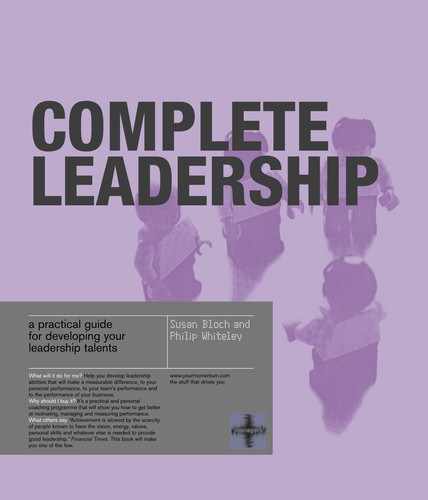
As he assumed the new role, a new logistics and computer system came on line and
implemented a ‘big bang’ that had significant performance issues. It led to serious
problems with suppliers, increasing debt and weakening morale among staff. Ian, who
had had a coach for three years, used the support that she had to offer. Most of the
solutions were of a technical and industry-specific nature, and Ian drew heavily on his
own knowledge of the business’s systems to map out solutions, but coaching – and
the strengthening of Ian’s personal skills – played a role in the turnaround that was
achieved. Judge for yourself how important each strand was as Ian relates the story.
‘When I took over as managing director [moving up from the post of operations
director], the company had just implemented the new system. It had gone badly wrong.
After all this great preparation for the leadership role I had hit the ground and the
business was facing its biggest challenge in years. The performance with the new
system was slow; it just didn’t work at a sufficient speed to cope with the demand
and the business fell behind. Debts went up. Cash flow struggled and our service
standards slipped. It was my first month, November 1999, and I was in at the deep
end.
‘What I thought was going to happen didn’t. I thought the business was on an even
keel. Business got behind and motivation among staff fell dramatically. Customer
perceptions were poor, because we were letting motorists down, and the big accounts
were run on the basis of efficiency and we were not efficient. I had more problems
than I had ever experienced in my career within two months of my promotion.
‘It was always “going to get better,” . . . but it didn’t. Or people would say, “we’ll tweak it,”
but they were being over-optimistic. We had all invested so much in it that we felt it
should work, and that it must work; but it didn’t. So, in terms of my work with my
coach, it was how to energize the business as this was not going to be a quick fix. In
truth, there was no magic formula. My coach gave me advice about my demeanour
and confidence. The best advice was when she said: “If your head goes down then the
business will follow. You have to stay positive and show tenacity – the leader has a
major impact on the business climate.”

momentum complete leadership chapter two
33
pages 32 /
‘You have to err on the positive side on balance; it is a case of mapping a way out, and
I was doing that taking a very complex problem and devising a planned series of
critical paths, and mobilizing resources. We had to invest even more, at a time when
the company was slipping. The normal reaction when a company is underperforming is
that you don’t spend, but that would have exacerbated the problem. So we had to
invest significantly and hire more people. Sometimes leading is having the strength to
go against the norm and take a long-term view.
‘There were difficult meetings towards the end of the year. We finished 1999 with
bad results for the year. My honest feeling at the time was one of total isolation,
irrespective of the fact that I had a coach, and I had a boss [the group CEO] who
knows a lot about the business. It was hard, because every day above and below me
people were looking to me to get us out of the situation. I knew that shareholders
were beginning to worry, as the biggest business in the group was underperforming
significantly. I knew that people within the business were feeling frustrated; like they
were wading through treacle. I have to say that those are moments when, no matter
how much personal confidence you have, you feel very isolated at the top.
In resolving business performance issues that are complex like that one, these are
areas where coaching is limited.
‘It was an area where I needed industry-specific skills. We needed more hardware;
extra disk space and to get through the backlog; we threw people at it. We just had to.
The route became both a technical solution and pure tenacity – it is amazing how the
business responds if the leader is outwardly confident and invests real time in taking
the team with you.
‘Towards the end of the hard period, feeling isolated, I thought very clearly that if I
didn’t improve then it was all on my head. That was the time when I needed the coach.
I felt unfairly treated. I took on the responsibility at a time that wasn’t right. I was given
a clear indication that unless I got out of it it was on my head. I felt a lot of resentment.
My coach helped me manage that resentment. She said, “It’s the way of the world.” It
made me mature in the responsibilities of being the leader. She said, “It’s not fair; but
..................Content has been hidden....................
You can't read the all page of ebook, please click here login for view all page.
